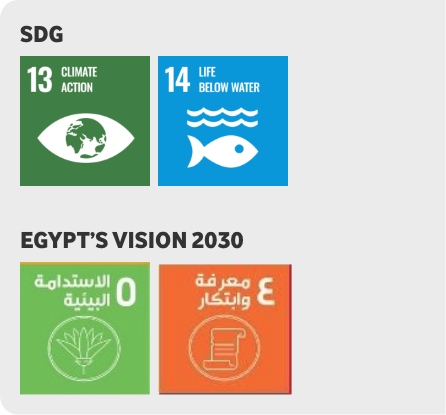Environment

Vodafone Environment
Environment
The world is undergoing rapid environmental change, and Egypt is particularly vulnerable to challenges like water scarcity and climate change. Vodafone Egypt has adopted ambitious climate and energy targets and has been strategically developing its contribution to environmental stewardship. While addressing our own impacts, Vodafone Egypt aspires to unlock and scale the power of digitalization, technology and innovation to address a wide range of environmental challenges, promote the development of smart, sustainable and digital infrastructure, streamline monitoring and optimization of environmental parameters in cities and buildings and drive the circular economy.
Climate & Energy
At Vodafone Egypt, we strive to create a better future for all. The unpredictable weather, flooding and constant natural disasters witnessed in Egypt and globally have renewed our vigour to support the achievement of Vodafone Group’s Science-Based Targets by 2030 and ensure that Vodafone Egypt’s operations are resilient and environmentally forward as possible. Energy is fundamental to Vodafone Egypt operations in many ways. Our facilities and infrastructure require energy, as much as our customers depend on it to power their devices and lead their daily lives. Every technology, products and action require energy at certain points, and as the demand grows, so does the pressure on the energy system and nature’s resources. The ongoing energy transition is not only about speed but also about ensuring that the future energy system is resilient, smart and sustainable in every way.
Journey to Net-Zero
Globally, the telecommunication industry alone is estimated to amount to about 2 to 3% of global energy demand, marking them as one of the most energy-intensive companies in their markets. During FY 2021/2022, Vodafone Egypt consumed 370 GWh of electricity. At Vodafone Egypt, we are taking bold steps on energy efficiency and renewable energy to become an energy-positive company and to meet Vodafone Group’s target of reaching 100% renewable energy by 2025. Vodafone Group is committed to fully abate for its own operations by 2030, and for the full carbon footprint by 2040 , ensuring commercial success does not come at a cost to the environment. Vodafone Group’s 2030 carbon reduction targets have been approved by the Science Based Targets initiative and are in line with initiatives aimed at keeping the global temperature increase to 1.5°C. We are committed to support the achievement of the Group’s targets by optimizing our operations and implementing carbon reduction measures..

Net-zero emissions will be achieved when all GHG emissions released by our operations are counterbalanced by removing GHGs from the atmosphere through carbon removal initiatives. By 2030 we will eliminate all emissions from direct fuel consumption and purchased electricity. Our plan includes reducing indirect scope 3 emissions generated across the full supply chain, including those from purchased goods and services, sold products, as well as transportation activities, and other operations by joint ventures. To ensure transparency and enhance the management of our carbon emissions, we have developed the carbon clock– a digital tool that tracks our activities and their related emissions. To follow our progress, please access our carbon clock here.
Renewable Energy – Solar PV
In efforts to reduce GHG emissions and achieve the Group’s 100% renewable energy target by 2025, we are currently operating 120+ sites with solar PV this includes across our buildings, headquarters, and cell sites. The solar plant on our building in Beni Suef started operation in 2020 and generated a total of 88.5 MWh during FY 2021/2022, that resulted in 37 mtCO2e of avoided emissions from purchased electricity. In 2021, we installed solar panels on our smart village premises in further efforts to achieve a target of 10% reliance on green power by 2030. Our facility in smart village generated a total of 366 MWh during FY 2021/2022 resulting in a total of 156 mtCO2e of avoided emissions.
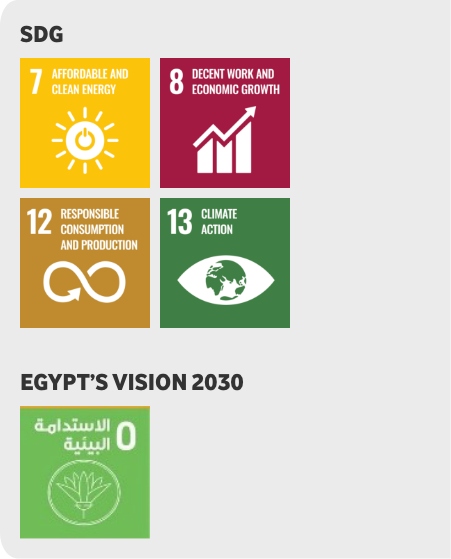

Energy and Water Consumption
The main types of non-renewable energy sources consumed across our operating sites include purchased electricity, purchased heating and cooling (HVAC systems), diesel fuel for powering generators and transportation fleet. Accounting for the fast-paced advancements in our digitalization, we are experiencing an average of 20-30% rise in consumption annually, of which heating and cooling consumption, however, stayed almost constant. We are working on implementing the requirements of the ISO 50001 (Energy and Water Management System), across our facilities to enhance.
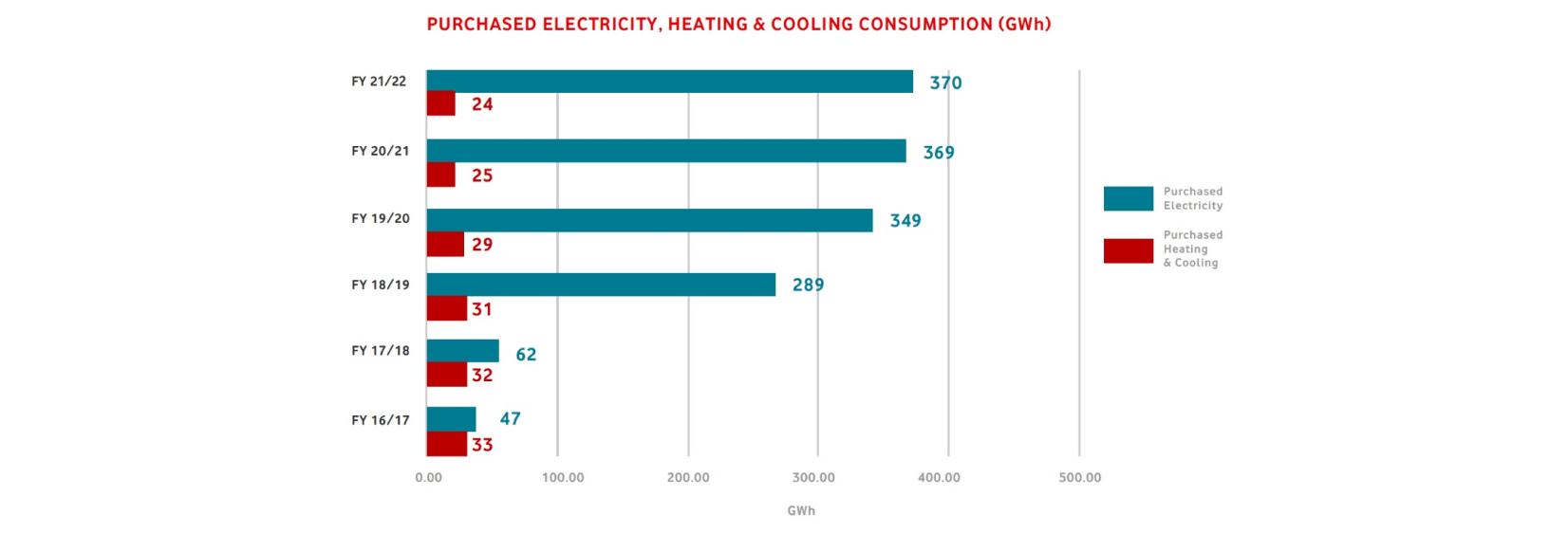
Implementation of Energy and Water Efficiency Measures
To create a green infrastructure at Vodafone, we set out to reshape our current operations and update to newer and sustainable equipment. The below initiatives were determined upon the assessment of our carbon footprint and high emission activities. Shifting from high consumption to more sustainable HVAC and tackling excessive water consumption is the beginning of shifting the whole operation to an environmentally conscious one.
LED Fixtures
940 mtCO2e/yr Reduction
We are currently in the process of replacing all our fluorescent lights with LED fixtures. As of 2021, we managed to reduce 26% and 7% of our electricity consumption across our buildings and cell sites respectively.
Water-Cooled Chillers
1200 mtCO2e/yr Reduction
This year we converted from air to a water-cooled chiller system at our headquarters building in the 6th of October City. These systems have higher efficiency, thus achieving a 30% reduction in electricity consumption compared to the previous system.
Air-Cooled Chiller
200 mtCO2e/yr Reduction
The installation of our adiabatic cooling system has led to the reduction of 32% of power consumption.
Water-Efficient Fixtures
110 mtCO2e/yr Reduction
Water-related energy use (treatment, pumping and distribution) is often overlooked due to its low contribution to organizations’ total consumption and emissions. At Vodafone Egypt, however, we take into account such small contributions, specifically when the reduction of these emissions also leads to a 50% reduction in water consumption.
Vodafone Egypt achieved a 29% reduction in its diesel fuel consumption in FY 21/22 compared to FY 2017/2018. This is attributed to our increased generation and consumption of solar PV renewable energy.

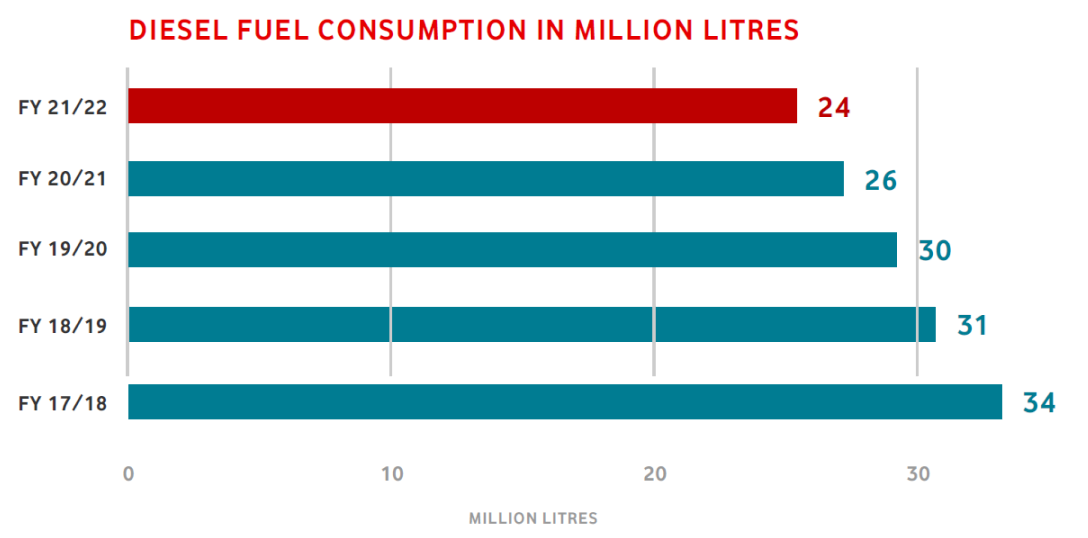
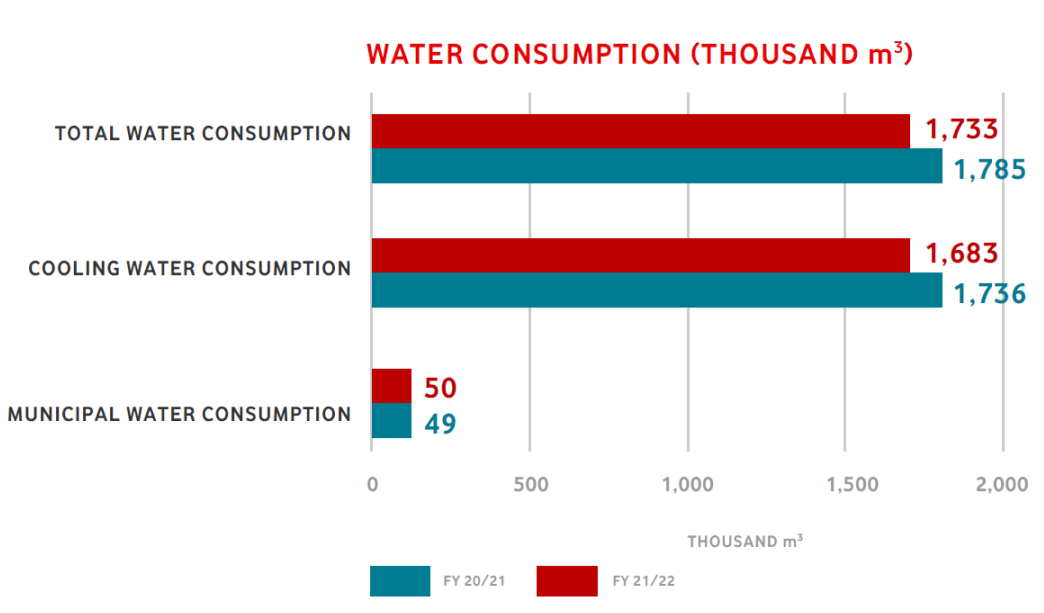
Circular Economy, Resources and Waste
As the circular economy goes beyond the pursuit of waste prevention, it also inspires sustainable digitalization and social innovation. Here at Vodafone, we realize our impacts on the environment and influence on society leading to the creation of a strong circularity approach influencing not only our operations but increasing the sustainability and awareness of our customers as well.
Paper Waste Reduction Efforts through Digitalization
During the reporting period, we have witnessed tremendous changes in our approach to paper consumption and waste management. Building on last year's Go Green initiative, where we worked on eliminating single-use plastics across our offices and stores, this year, we are shifting towards paperless operations. Backed up by the need for a paperless operation, all our stores currently provide digital receipts and SMS queue turns
OurHaystack was also the fruit of our ambition to reduce our paper consumption and accelerate the shift towards digitalization. With haystack, anyone can create a fully customized digital business card with embedded enterprise features according to your needs.
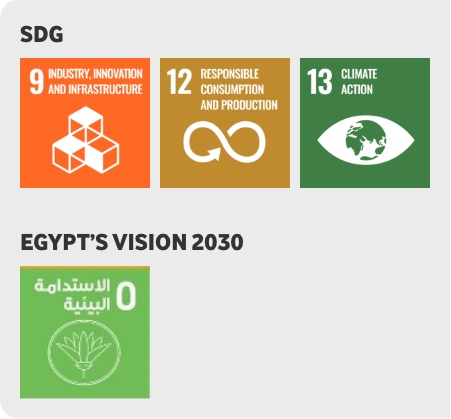
Hindered by our working from home, providing our monthly employee recognition certificates and ensuring their proper recognition was at risk. This offered a great opportunity to forego hard copy certificates and implement a soft copy initiative backed by digital employee recognition. We were successful at keeping employees' satisfaction and eliminating some of our carbon footprint emissions.
E-CERTIFICATES
200
per month
Resource Efficiency and Recycled Content Products
At Vodafone Egypt, we recognize our past impact and contribution to the unsustainable use of resources which as a whole has led to widespread environmental degradation and material scarcity, affecting the whole population and future generations. At our core operations, we build on yearly initiatives to reach green and sustainable society. This year in further efforts to eliminate our impacts, we shifted to using recycled retail plastic bags, offering recycled giveaways and are currently in the pilot phase of creating Eco Sim cards.
Eco-SIM Card

The Eco-SIM initiative’s goal is to reduce our plastic and carbon footprint through using sim cards created from 100% recycled material instead of virgin plastic. We are the first telecom company in Egypt to launch in 2022 these SIM cards to our customers.
Waste Management
Vodafone Egypt segregates and monitors its generated waste quantities by type, and properly disposes them through a waste management company. On average, each employee generates 2.8 kg of waste at our premises per year.
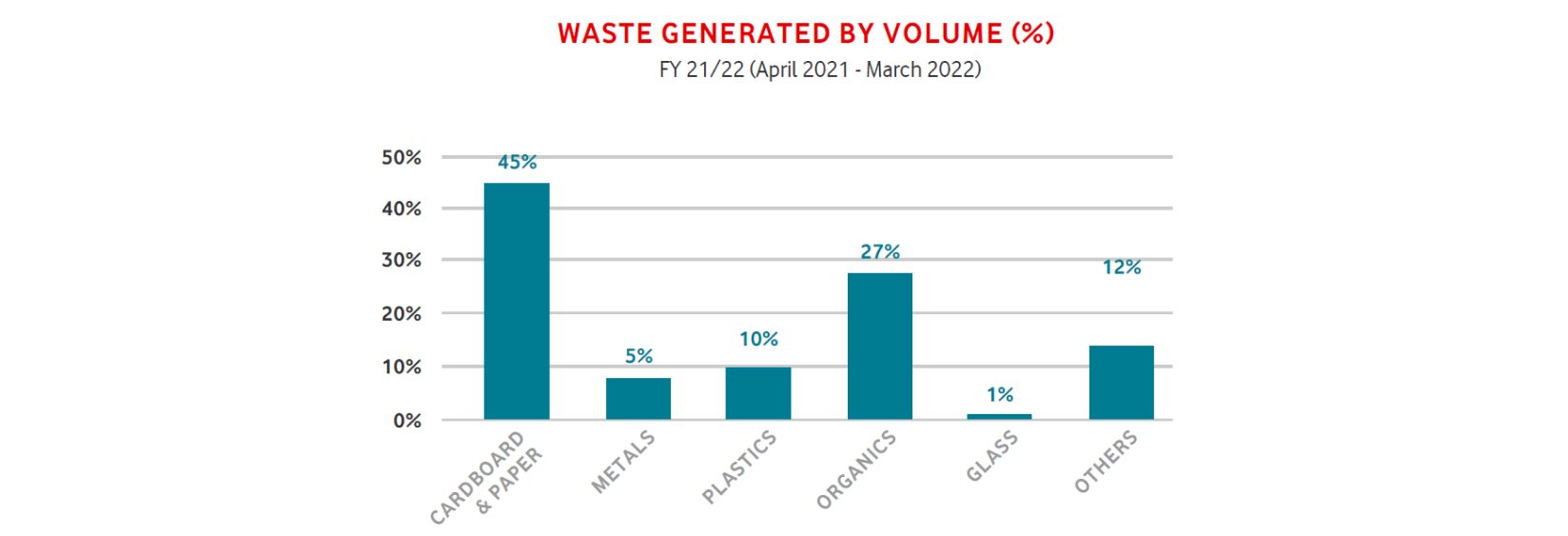
Fostering Sustainability Together
Sharing our sustainability goals and initiatives and fostering environmental inclusion has been at the top of our employee and customer engagement plan. Our aim is to foster and encourage environmental belonging and community wellbeing at each step of the way to promote awareness and responsibility towards future generations.
Promoting e-Waste Management: e-Tadweer
Vodafone Egypt launched e-Tadweer app in strategic partnership with the Ministry of Environment, Waste Management and Regulatory Authority, and the UNDP. This flagship initiative is the first national digital platform that encourages and facilitates the rise of the recycling industry across Egypt. Electronic waste includes consumer and business electronic equipment that is near or at the end of its useful life. Such waste materials contain toxic components that could be detrimental to human health and the environment; hence, proper disposal is vital. With the fourth industrial revolution – the rise of the digital era, more and more e-waste is generated and improperly discarded.
Seeing as Egypt is one of the highest e-waste generators in Africa, contributing to approximately 500-600 kt of e-waste per year, the initiative is core to start streamlining the concept of recycling across the nation. We contributed to the initiative by providing digital consultancy during the app development, raising awareness through our social media platforms and through SMS campaigns and donating 10,000 tons of electronic waste to initiate the recycling cycle. Constant incentives are provided, e.g. discounts on mobile accessories or collection point at the Vodafone store to incentivize the community into joining the initiative.
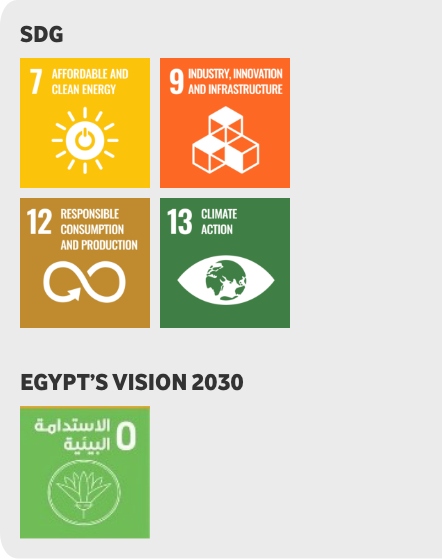
Green Economy Forum
During the Green Economy Forum , and as one of the Live Green strategic partners, Vodafone had the chance to officially reveal the app and increase awareness of the issue and offerings. As a result, and in collaboration with a wide number of digital hubs to raise awareness, 180k people downloaded our app, and 1.2mln were exposed to the launch.

Earth Hour Day
Vodafone Egypt will be joining millions around the world on Earth Hour Day every year, in turning off their lights in support of nature and our environment.
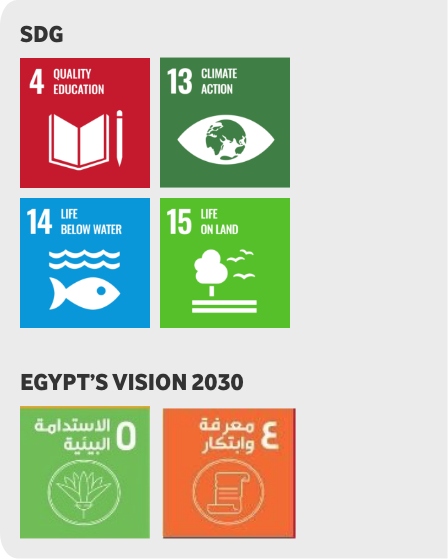
#Passion4Action
Our annual company-wide initiative aims to reduce 4 tons of our carbon emissions through recycling and waste reduction.
This year we conducted an eco-friendly bazaar during our annual planet week where training sessions about plastic hazards and recycling were conducted.
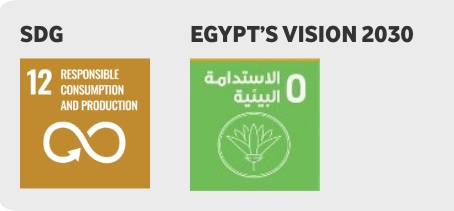
Green Team and Energy Efficiency Training
We provide constant training programs across all functions to a number of employees to support their upskilling and integration and assistance in our energy efficiency initiatives
Our Green Team consists of ambassadors from each function aiming to bring to the table new climate efficiency ideas and mitigate climate challenges.
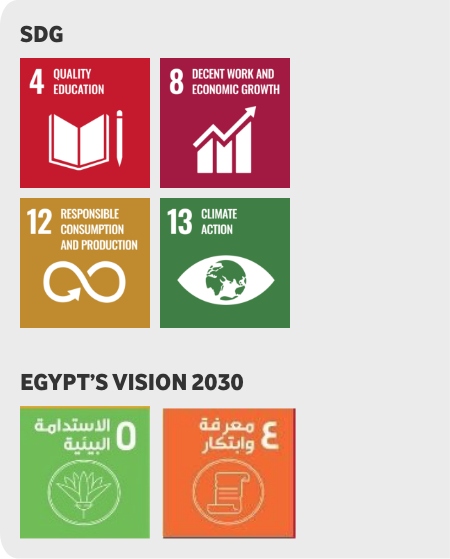
ISO 50001
Vodafone Egypt obtained ISO 50001 - Energy Management Systems “EnMS” for its Access Sites, Switches, Office Buildings, Data Centers & Retails.
